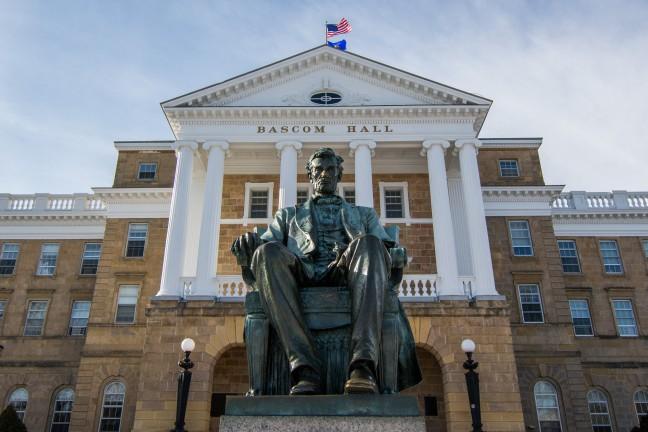In our modern era, we often hear about the need to change historical narratives and perhaps none more so than that of Christopher Columbus. Once celebrated as an explorer who “discovered” America, information throughout time has proven he was brutish. In my view, it is more precise to say that he was the last man to discover America.
There are a growing number of activists and politicians advocating for the creation of an “Indigenous Peoples Day” to replace Columbus Day. In their eyes, Columbus was the beginning of a dark and genocidal period for Native Americans and that’s what’s most significant about his 1492 voyage. It’s made clear every year with the signs placed after every Columbus Day weekend on Bascom Hill.
Initially supported by the Ku Klux Klan in the early twentieth century to scare immigrants and Catholics, the movement to end Columbus Day now focuses exclusively on the perspective of the natives.
Columbus was known for inhumane actions. He was named “Governor of the Indies” following his first voyage and under his leadership, slavery was administered on the native populace and even some colonists who politically opposed him. Is this not an example of the injustices Europeans brought to the Americas? Actually, it isn’t. Those injustices already existed and were implemented by the indigenous peoples centuries before the arrival of white Europeans.
Dejope sacred fire circle vandalized in ‘intentional, despicable act’
If you’re going to examine fifteenth century Europeans with a twenty-first century lens, then it’s only fair you do the same with Native Americans. Slavery as an institution was used among Native Americans, most notably the Aztecs. Slavery, of course, has been used since the beginning of civilization in places like Sumer. Both the Aztec and the Spaniards believed it was necessary for the success of their empires. Abolitionist movements weren’t powerful yet, partly because of the lack of a widely known viable alternative. At least Columbus was held accountable for his atrocities by other Spaniards, never to hold the title of governor again.
Then there’s the matter of sacrifices. The Aztec were known for killing a mountainous number of people all in the name of pleasing their gods. It is believed that 20,000 were sacrificed annually, though the number could be higher. An estimated 80,400 were killed for the dedication of a temple to the god Huitzilopochtli in 1487. To honor him, sacrifices would have their hearts cut out and their heads severed. Other gods like Tlaloc received child sacrifices. These children would be killed by having their throats slit.
While not widespread, cannibalism existed in some Native American tribes as well. Archeological evidence reveals the Anasazi — a tribe that was located in southwestern Colorado — did eat other humans. Initially rare and only used as a last resort in times of starvation, cannibalism did become more common within the tribe throughout time and during periods when there were no food crises.
As in Europe, war was typical in the Americas before Columbus. The indigenous peoples who lived in pre-state societies weren’t peaceful. Powerful tribes rose and fell, usually over strategic lands for hunting. Liberals often say we stole this country (even though there was no single nation before the United States), but tribes often did the same to each other.
State Rep. introduces ‘Indigenous Peoples Day’ legislation, looks to honor Native Americans
This isn’t to say Europeans were better. The Old World was riddled with its own history of violence. Just as in the Americas, great powers like Carthage and Rome conquered others in Europe, but they also fell over time. Kingdoms of the Middle Ages fought each other over territory just as tribes in the Americas did. It’s the natural cycle of civilizations.
Of course, the brutality committed by different tribes in the Americas isn’t the only part of their history that should be remembered. The same is true for European colonization. Whether you choose to celebrate or protest Columbus, whether you think of him as a hero or villain, the real answer is neither.
Columbus and the settlers who followed him to the New World were men of their times and must be understood in the context of those times. The same is true with the native populations. The Aztec were one of the first civilizations to have mandatory education. European colonies, particularly those established by the British, brought Enlightenment philosophy with the principles of private property rights and the social contract. These contributions to the world still matter today.
The extent to which critics go to trash Columbus can get so bad it’s comical. Columbus should not bear responsibility for what happened centuries after he passed away. He’s not responsible for the beginning of a massive genocide. Between 75 and 90 percent of the Native American population was killed off by disease through basic interaction with Europeans.
Critics will fire back by declaring that biological warfare was used by European colonists and later the Americans by giving natives blankets infected with diseases like smallpox, but political scientist Guenter Lewy has found only a handful of such instances. Their experience is of no comparison to Joseph Stalin’s purges and Adolf Hitler’s Holocaust.
At first, it was only common to hear about the good Columbus brought. This narrative was inaccurate and unfair. Thanks to new information and primary accounts from the native populations, we can enjoy a balanced view of the impact of European colonialism. At the same time, it is a disservice to remember this period as only being negative and disregarding any benefits to come out of it. On with Columbus Day!
John Graber ([email protected]) is a senior majoring in history and political science.




















